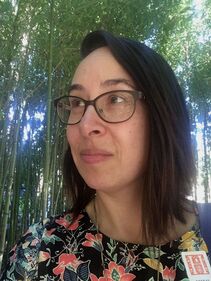The Fall River Line
Remember when you were a penniless grad student
and you rode your bike to your friend’s house, arrived
breathless and happy, got a phone call and your
grandfather was gone? How your friends held you in your grief,
how they’re not all your friends any more but you’re grateful still?
Remember the chairs your family had, before your family
broke up, reconfigured? That were softened by years
of human touch, that were said to have come from the ships
of the now-defunct Fall River Line? Remember how you read
The Catcher in the Rye to yourself every year from childhood
to adulthood, seeing Holden Caulfield grow younger each time?
Remember how you walked the halls of the Museum of Natural History
dreaming of crossing great distances? Then, remember those long days
waiting in the hospital in Delhi like a package to be shipped home?
How you could not speak or eat with your broken mouth,
how strangers came from the embassy, from the language school,
how a friend of a friend of your Hindi teacher came to comfort you?
How they brought you flowers and paperback mysteries,
spoke kind words to your dumb face? How because you could do
nothing else, you were steadfast, patient? How you made it home,
eventually, and read The Catcher in the Rye to yourself, just some years,
from young adulthood to middle age, watching Salinger grow more
lecherous each time? Remember when you couldn’t stop being angry
at tiny perceived slights, at everyday disorder, at the careless
evil of the world? Remember how your husband, your friends, listened
patiently? How you stopped reading Salinger, took up Ferrante,
and the fog of anger lifted a bit? How you found, at a yard sale, chairs:
not quite the chairs of the Fall River Line, but close? How you placed them
in your rooms, because now you had rooms? How it was morning, the air
just cool enough? How your breath kept moving through your body?
and you rode your bike to your friend’s house, arrived
breathless and happy, got a phone call and your
grandfather was gone? How your friends held you in your grief,
how they’re not all your friends any more but you’re grateful still?
Remember the chairs your family had, before your family
broke up, reconfigured? That were softened by years
of human touch, that were said to have come from the ships
of the now-defunct Fall River Line? Remember how you read
The Catcher in the Rye to yourself every year from childhood
to adulthood, seeing Holden Caulfield grow younger each time?
Remember how you walked the halls of the Museum of Natural History
dreaming of crossing great distances? Then, remember those long days
waiting in the hospital in Delhi like a package to be shipped home?
How you could not speak or eat with your broken mouth,
how strangers came from the embassy, from the language school,
how a friend of a friend of your Hindi teacher came to comfort you?
How they brought you flowers and paperback mysteries,
spoke kind words to your dumb face? How because you could do
nothing else, you were steadfast, patient? How you made it home,
eventually, and read The Catcher in the Rye to yourself, just some years,
from young adulthood to middle age, watching Salinger grow more
lecherous each time? Remember when you couldn’t stop being angry
at tiny perceived slights, at everyday disorder, at the careless
evil of the world? Remember how your husband, your friends, listened
patiently? How you stopped reading Salinger, took up Ferrante,
and the fog of anger lifted a bit? How you found, at a yard sale, chairs:
not quite the chairs of the Fall River Line, but close? How you placed them
in your rooms, because now you had rooms? How it was morning, the air
just cool enough? How your breath kept moving through your body?
Chloe Martinez is the author of the chapbook Corner Shrine (forthcoming from Backbone Press). Her poems have appeared in Waxwing, Prairie Schooner, The Common and elsewhere. A Best New Poets nominee and a three-time Pushcart Prize nominee, she is the Program Coordinator for the Center for Writing and Public Discourse at Claremont McKenna College, as well as Lecturer in Religious Studies.
Art: Molly Dunham
Powered by Women

